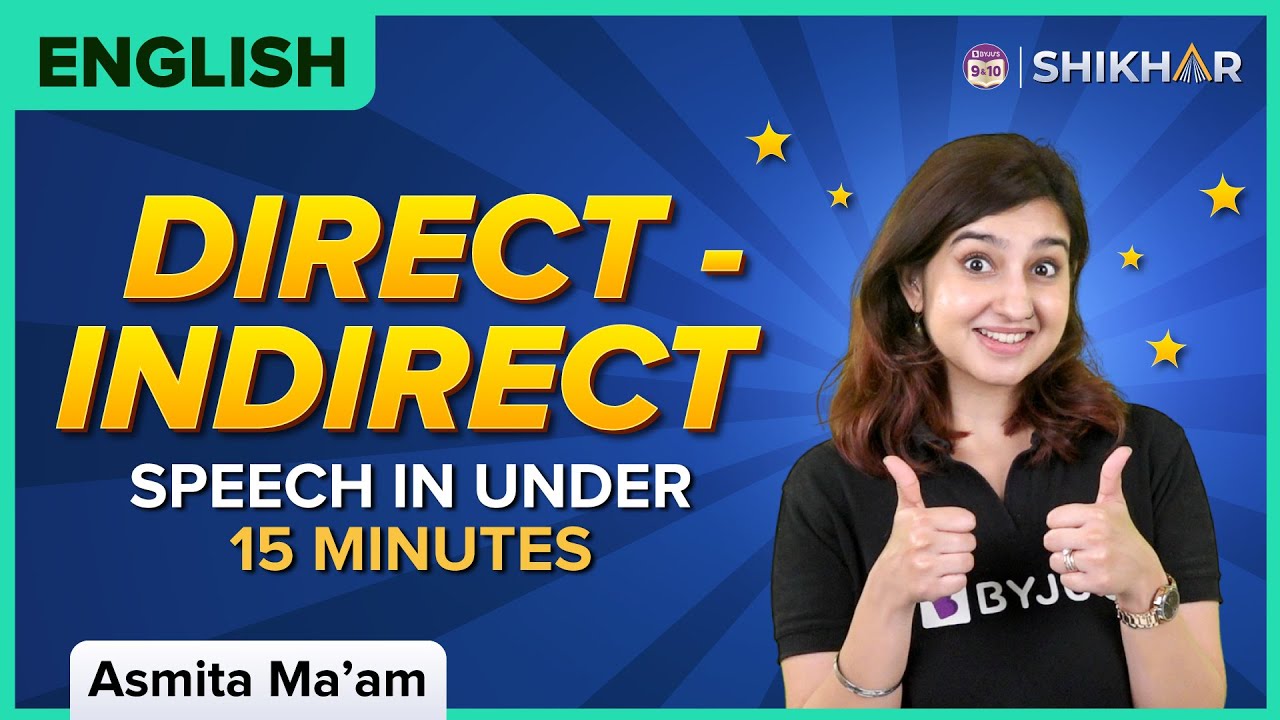Direct Indirect Speech / Kalimat Langsung dan Kalimat Tidak Langsung
Summary
TLDRThis transcript discusses the differences between direct and indirect speech, explaining how speech can be reported either by quoting exactly what someone has said (direct speech) or by rephrasing it for clarity and flow (indirect speech). Direct speech involves the use of quotation marks, while indirect speech requires adjustments to pronouns, verbs, and time references. The transcript also provides examples to illustrate these changes, highlighting how the context of a statement can affect its presentation in indirect speech. It further explores nuances such as transforming statements into questions or comments and altering tense for reporting purposes.
Takeaways
- 😀 Direct speech involves quoting someone's exact words, typically enclosed in quotation marks.
- 😀 Indirect speech conveys the essence of someone's words without quoting them exactly, often altering the sentence structure for clarity.
- 😀 In direct speech, quotation marks are used to highlight someone's exact words.
- 😀 Indirect speech often removes quotation marks and changes the pronouns, verb tenses, or time references to fit the context.
- 😀 Direct speech can be converted into indirect speech by adjusting the pronoun, verb tense, and removing quotation marks.
- 😀 Example: 'I play basketball every Saturday' in direct speech becomes 'She said she played basketball every Saturday' in indirect speech.
- 😀 The conversion to indirect speech may involve changing the sentence structure to make it more natural for the listener.
- 😀 Indirect speech can also modify statements into questions or other forms based on how the information was originally conveyed.
- 😀 Example of reported speech: 'Happy finish your homework' can become a statement in indirect speech like 'He/she said that he/she finished homework.'
- 😀 Words like 'if', 'then', and 'would' are commonly used in indirect speech to reflect conditions or hypothetical scenarios.
Q & A
What is the main difference between direct and indirect speech?
-Direct speech quotes someone's exact words, using quotation marks. Indirect speech reports the meaning of what was said, often altering the tense, pronouns, and time references.
What is an example of direct speech?
-An example of direct speech is: He said, 'I play basketball every Saturday night.' The exact words of the speaker are quoted.
How does indirect speech differ in terms of verb tense?
-In indirect speech, the verb tense typically changes from present to past. For example, 'I play' becomes 'he played'.
What are the key changes when converting direct speech to indirect speech?
-The key changes include removing quotation marks, adjusting pronouns (e.g., 'I' becomes 'he'), changing the verb tense (e.g., from present to past), and modifying time references (e.g., 'tonight' becomes 'that night').
What happens to pronouns when converting from direct to indirect speech?
-Pronouns in direct speech are usually changed to the third person in indirect speech. For example, 'I' becomes 'he' or 'she'.
What happens to time references in indirect speech?
-Time references may need to be adjusted when converting to indirect speech. For example, 'tonight' could become 'that night' or 'today' could become 'that day'.
Can indirect speech be used for yes/no questions?
-Yes, indirect speech can be used to report yes/no questions. For example, 'Did you finish your homework?' becomes 'He asked if I had finished my homework.'
What is an example of indirect speech for a statement?
-An example of indirect speech for a statement is: 'He said that he played basketball every Saturday night.' The verb 'play' is changed to 'played', and the pronoun 'I' becomes 'he'.
How is a command reported in indirect speech?
-A command in indirect speech is usually reported by using verbs like 'tell' or 'order' and adjusting the verb form. For example, 'Close the door' becomes 'She told me to close the door.'
Is there a change in how questions are reported in indirect speech?
-Yes, when reporting questions in indirect speech, the word order often changes and auxiliary verbs may be adjusted. For example, 'What time is it?' becomes 'He asked what time it was.'
Outlines

This section is available to paid users only. Please upgrade to access this part.
Upgrade NowMindmap

This section is available to paid users only. Please upgrade to access this part.
Upgrade NowKeywords

This section is available to paid users only. Please upgrade to access this part.
Upgrade NowHighlights

This section is available to paid users only. Please upgrade to access this part.
Upgrade NowTranscripts

This section is available to paid users only. Please upgrade to access this part.
Upgrade NowBrowse More Related Video

Learn English Grammar: DIRECT & INDIRECT SPEECH (REPORTED SPEECH)

6º ano - Língua Portuguesa – Vol 2 – Discurso direto e indireto

REPORTED SPEECH - PENGGUNAAN DIRECT AND INDIRECT SPEECH - RUMUS DAN CONTOH

Direct - Indirect (Reported) Speech in Under 15 Minutes | Class 9 and 10 | English | BYJU'S

BAHASA INGGRIS SMA - Reported Speech (Indirect & Direct Speech) | GIA Academy

Direct and Indirect Speech | Cheat Sheet Series For Class 6th & 7th
5.0 / 5 (0 votes)